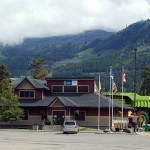Home »

A good time to think outside the box
e-KNOW Editorial
Former District of Invermere Mayor Mark Shmigelsky was fond of reminding fellow Regional District of East Kootenay (RDEK) directors from the Elk Valley about how lucky they were to have the coal mines in their backyards.
Not only do the mines bring economic prosperity and employment to the Elk Valley but it also results in a healthy injection of financial support every year in the form of the Elk Valley Property Tax Sharing Agreement (EVPTSA).
The EVPTSA benefits the District of Sparwood, City of Fernie, District of Elkford and RDEK Electoral Area A. The 25-year agreement, signed in 2008, shares the property taxes levied on the industrial coal mining properties in the Elk Valley.
Those funds go toward any number of Elk Valley needs and the agreement seems to work quite nicely for all parties involved, including Teck which while its tax levy increased by $2 million, it is now protected from large property tax increases as per the agreement.
We mention this because we have been thinking about the Village of Canal Flats and how the closure of the Canfor owned sawmill is going to impact its ability to provide services, as the village’s main tax vehicle will be no more. It isn’t just the 80 or so families that will suffer from the mill closure; the village strongly relies on the tax funds derived from having a large mill in its municipal boundaries.
In order to bolster the young village’s future, we suggest that municipal, regional and provincial leaders contemplate a similar agreement with Skookumchuck Pulp Mill owner Paper Excellence Canada Holdings Corporation. The company purchased the massive pulp mill in 2013 off Tembec for about $89 million.
While the scale of operations and revenues pale in comparison to the Elk Valley coal mines, Skookumchuck sits in the middle of rural East Kootenay; no municipal government benefits from taxation.
A tax share agreement, ala the Elk Valley Mine Revenue Sharing style would provide funds for the Village of Canal Flats, and possibly the District of Invermere and cities of Kimberley and Cranbrook, all municipal jurisdictions in need of more big-ticket industrial taxation.
The Village of Radium Hot Springs has a mill, for now. The Elk Valley has the coal mines for the next few decades, anyway.
So why not think outside the box a bit and contemplate such a move to help Canal Flats, at least, stave off financial starvation. It would have to be agreeable to all parties, including the mill ownership and a good agreement could be ironed out. Why not give it a whirl and redirect more taxation revenue into local needs as opposed to the black hole of Victoria.
We need strong, determined and realistic leadership now as world’s economic ways continue to shift away from a model anchored below the high water mark of the ’08 tanking.
Kudos to Kimberley
The City of Kimberley is trying to address its economic needs in a strong, determined and realistic way. The SunMine is a perfect example of changing up the economic outlook and by now opening the door for three medical marijuana dispensaries it is setting itself up as first out the door when legalization occurs, which it will, eventually.
Marijuana legalization will produce jobs that do not exist now (legally) and taxation streams will be fattened, locally, provincially and federally. One of these days the money-grubbing Tories will figure that simple fact out – but let’s remember they don’t dig science or facts much when they go against their own hard and stand-fast narrow-mindedness and timidity borne from never venturing far from the safety of their own confusions.
So kudos again to the City of Kimberley on its courage and far-sightedness.
It could become known as Kimberweed and other such nicknames, but it will produce fuel for the local economy and create another dimension for its tourism industry as travellers come to check it out for being so ‘open minded.’
And here hoping local leadership and those farther afield get working together to find a way to ease the pain that is coming up in the Columbia Valley.
Ian Cobb/e-KNOW







